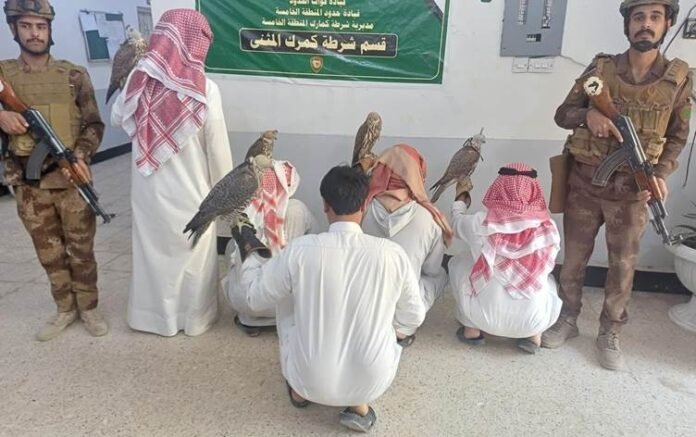Iraq has stepped up its efforts in wildlife protection in Iraq after authorities arrested several hunters in the country’s southern deserts. The Interior Ministry reported that patrols detained five individuals for illegally hunting animals in Muthanna province.
Patrols from the Muthanna Customs Police, under the Border Forces Command, conducted intensive field monitoring. As a result, they caught four Kuwaiti nationals holding tourist visas and one Iraqi accompanying them in the Adima area.
Officials confirmed that the hunters practiced illegal hunting within Iraqi territory. Authorities also seized five falcons and two vehicles with Kuwaiti license plates. The Interior Ministry promptly applied legal measures to all those involved.
These arrests reflect ongoing initiatives to strengthen wildlife protection in Iraq. Illegal hunting and trafficking have long threatened ecosystems due to instability, weak enforcement, and high demand in regional markets. Therefore, authorities continue to monitor vulnerable areas closely.
For instance, traffickers often target falcons from Iraq’s southern plains and rare birds and foxes from Kurdistan’s mountains. They sell these animals at high prices, putting pressure on endangered species. Moreover, smuggling networks exploit weak enforcement, which makes conservation efforts more challenging.
Although Iraq signed the Convention on the Protection of Animals in 2014 to regulate global wildlife trade, illegal hunting and trafficking remain widespread. Consequently, authorities are expanding patrols and inspections to enforce the law effectively.
Recent incidents highlight the severity of wildlife crimes. In June, local officials reported that nearly all 400 gazelles in an animal reserve in Diyala province’s Mandali district went missing. They suspected theft or smuggling, which underscores the urgent need for wildlife protection in Iraq.
The Interior Ministry plans to extend field operations to other desert areas. Authorities aim to deter illegal hunting, safeguard endangered species, and ensure compliance with national and international wildlife laws. Additionally, public awareness campaigns will educate communities and visitors about sustainable practices.
By combining law enforcement and outreach, Iraq strengthens its conservation efforts. Authorities hope these actions will reduce illegal hunting while encouraging protection of natural habitats. Ultimately, wildlife protection in Iraq remains a top priority to preserve biodiversity for future generations.


